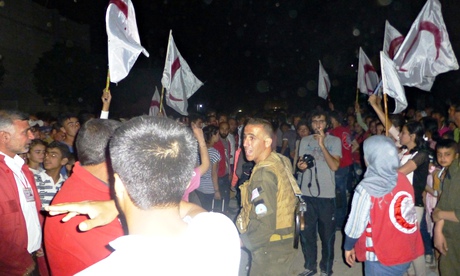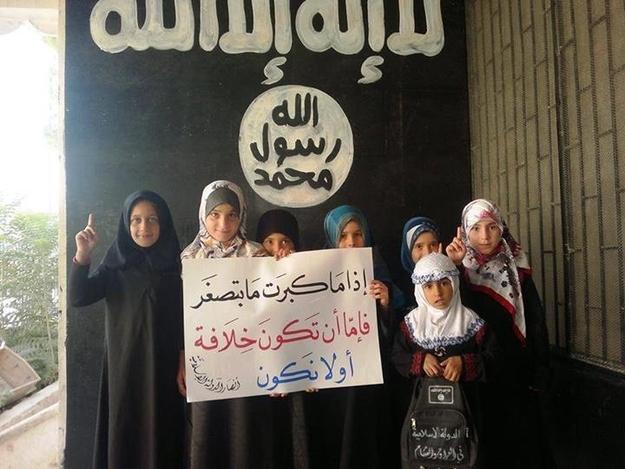
AYN AL-ARAB, Syria--Mustafa Hassan had only been in captivity for a few hours and already he was planning his escape. After four days, he found his moment. While some of his fellow schoolboys distracted the religious teacher with questions, Hassan and a friend scaled a ladder on to the roof on the pretext of fetching water and raising a flag.
From there, they hopped on to the wall of the school, jumped down to the street and kept walking. Local people helped them get out of town. Soon they were back in this Kurdish-dominated town of northern Syria.
They were the lucky ones. They left behind scores of classmates, Kurds from northern Syria, who remain captive – kidnapped by the extremists of Isis (Islamic State in Iraq and the Levant). Escape is not to be taken lightly: one Isis fighter warned them that anyone caught trying to leave would be beheaded.
"They asked us whether we wanted to join jihadis or not, to join Isis," Mustafa recalls. "No one did. If the students were loud or chaotic, they were beaten with an electrical cable.
"Ten boys were beaten every day. But most of us were well behaved, to not get beaten. Some of the boys were crying, some turned yellow with fear. They showed us a documentary film from Iraq: of people being slaughtered."
The kidnapping of 186 teenage boys in Syria on 30 May has gone largely unreported in the wider world, a curious omission given the outcry over the teenage girls in Nigeria. The abduction was no less sinister. The students needed to travel from the Kobani enclave on the Turkish border to Aleppo to take their exams – as required by Syria's education system. The journey is perilous but the students reached Aleppo without incident. On the way home however, a convoy of about 10 minibuses containing 186 boys aged 14-16 was stopped and taken to a religious school in Minbej, for training in the Qur'an and jihad. The vast majority are still there.
"The food was good. At breakfast we had peas and sweet things," Mustafa says.
The Isis fighters were intimidating – and international. "I saw a lot of Russians, Chechens. Libyans, some Saudi Arabians and Syrians too," he adds.
Scores of desperate parents in Kobani have been left sitting and waiting. One man, who spoke on condition of anonymity, said the information gap was agonising: there had been rumours that the boys had been beheaded, that they had been released, that there was a deal to swap them for Isis jihadists held by Kurdish fighters. And numerous variants in between.
"I am in a bad situation, psychologically so bad and confused," one father said, surrounded by his three other young sons. "My son doesn't just belong to us, he belongs to everyone in his city. He is not just a Kurd, he is a citizen of the world.
"My son is so thin, a weak boy – he is ill, you know. He can't eat wheat – he has to have a special diet. I worry that they might be brainwashed into jihad or carrying weapons. His brain is young and flexible – maybe they can wash his mind."
Everyone knows a parent with a missing child in Kobani, he says, and he knows many of them himself. All the parents have met on several occasions to swap rumours and ideas. Like many of them, however, the father is losing faith that anyone outside Kobani really wants to help – and the kidnapping is helping to sow the seeds of suspicion between Kurds and Arabs in Isis-held areas. Some parents, he says, have phoned Arab friends in Menbej to make gentle inquiries, but have been told they have nothing to do with the kidnapping and can't do anything to help. "I don't know whether to believe them."
Kobani remains a haunted, desperate city. At a checkpoint near the frontline of fighting between Kurds and Isis, a huddle of parents of the missing boys had gathered, having misunderstood rumours about returning students. At the Kobani regional administrative offices, one official said that Isis had demanded that the families put up placards and posters protesting their dislike of their governors so as to oust the regional Kurdish authorities.
The abduction has made the difficult Kobani-Aleppo journey all but impossible. Hundreds of students have been marooned in Aleppo since the kidnapping, unsure of the best way home. Syrian Arab Red Crescent workers in Kobani recently embarked on a mission to bring busloads of teenagers back the long way round, via Turkey, a trip that will take days rather than hours.



